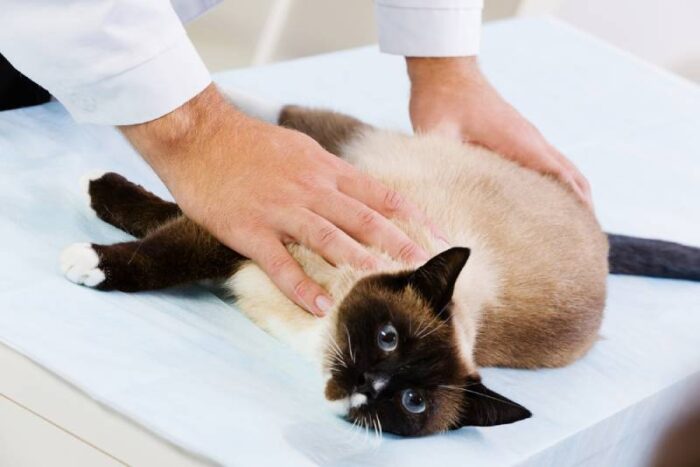With their distinctive color points, piercing blue eyes, and vocal personalities, Siamese cats never fail to make a statement. As one of the oldest and most beloved pedigree breeds, their popularity continues rising across the globe. However, such selective breeding also predisposes Siamese cats towards certain genetic conditions new owners should understand before welcoming one of these talkative companions into their home. In this post we talk about Siamese Cats Health Issues.
By knowing key Siamese health concerns in advance, cat parents can provide attentive care supporting the best paw-sible wellness and longevity.
Sensitive Respiratory System
Starting from kittenhood, many Siamese struggle with chronic upper respiratory and sinus troubles. Everything from allergies and infection susceptibility to cleft palates or distorted nasal passages contribute. Since Siamese vocal cords also sit differently, they easily grow irritated.
As a result, issues like wheezing, snoring, sneezing and runny noses plague the breed. Their nasal congestion also makes eating challenging, leading to messy faces and finicky appetites. Without supportive care, respiratory distress severely impacts their quality of life.
If your Siamese experiences ongoing nasal, throat, or lung symptoms, schedule veterinary exams to pinpoint causes and recommend treatment options. Strategies like air filtration, humidity control, gentle facial cleaning, dietary adjustments, ant-inflammatory medications, or even surgery remain necessary for their comfort in many cases. Stay alert to changes signaling new or worsening problems.
Sensitive Stomach Issues
In connection with upper respiratory structures, Siamese often struggle with sensitive digestion too.Specifically, inflammatory bowel diseases like IBS and food allergies occur frequently. Symptoms involve gastrointestinal upset after meals, frequent vomiting or regurgitation, and loose stools. Noticeable weight loss, cramping, or loss of appetite points to malnutrition from poor nutrient absorption.
Again, tailoring diet to better manage digestion proves essential for Siamese wellness.Specialized prescription diets or careful homemade alternatives with digestibility-enhancing ingredients provide lifesaving nutrition during flare-ups. Partnering closely with your vet ensures your Siamese eats adequately during episodes without fueling more inflammation through uncontrolled ingredients or portions. Patience identifying well-tolerated, novel protein sources prevents devastating malnutrition.
Eye Troubles
All Siamese share light blue eyes from partial albinism tied to their color point DNA. But unfortunately, this genetic quirk also predisposes them to injury, infection, and degenerative issues.
For starters, their blue irises lack eye pigment that normally filters sunlight. This leaves sensitive retinas vulnerable to harsh UV damage. Photophobia, corneal ulcers, blindness, and cancer risks increase without preventative measures. Never allow unfiltered sun access!
Additionally, the shape of Siamese eyes allows debris or secretions collecting more easily along their flattened bridge and nasal regions. Tear staining and secondary eye infections cause chronic irritation. Take care to gently wipe crusted areas with approved cat eye cleansers between veterinary visits for medication if needed.
Finally, Siamese often develop early onset genetic eye diseases causing progressive vision loss or blindness too. Annual vet examinations help catch changes in lens degeneration, retina atrophy, glaucoma risk, or optic nerve damage in time to adjust care accordingly. Never skip screenings!
While daunting, attentive owners can support their Siamese through most eye complications via medical intervention, protected environments, and practical aids accommodating disabilities. Their outgoing nature lets them thrive even sans sight with proper assistance. Stay involved managing eye health to prioritize comfort and safety.
Dental Disease
Between funky bites misaligning their teeth and making self-cleaning difficult plus gum irritation from breathing through open mouths, Siamese face elevated dental disease. By middle age, most deal with significant plaque, tartar, and tooth decay issues. Bacteria then spreads internally causing preventable organ and heart problems.
Making professional cleanings with full mouth x-rays every 6-12 months remains non-negotiable for Siamese health. Only vet dentals with polishing and antimicrobials properly remove buildup and infection from tooth roots and gums. Blood panels before procedures also reduce anesthetic complications in symptomatic cats.
For in-between visits, add dental treats, oral rinses, and plaque-removing kibble to your Siamese’s regimen. Gently rubbing the lip folds with cleaning pads after eating may supplement medication too. Catching dental issues early vastly improves the odds of restoring comfortable chewing and eating.
The Takeaway
There’s no denying Siamese require slightly more involved care coping with their inherent physical quirks. But their wildly gregarious and entertaining personalities make the extra effort worthwhile for most devoted caretakers. By working closely with your veterinary team, most cats enjoy excellent quality of life despite managing chronic issues. Your attentiveness spotting changes for early intervention remains the key to success. So here’s to many healthy years of meowing, purring, prancing, and playing with these fabulously talkative blue-eyed beasts! I hope this Siamese Cats Health Issues post helps you.
Related posts:

Dr. Katie Lawlor is a seasoned expert in pet care with over 8 years of experience dedicated to enhancing the well-being of pets and their families. As a passionate advocate for animal health, Dr. Lawlor combines her extensive knowledge with a compassionate approach, offering valuable insights and practical advice on pet wellness. Her commitment to improving the lives of pets and their owners is reflected in her engaging content on PetPawsitively .com. Follow Dr. Lawlor’s work and connect with her on Instagram for expert tips and support.

